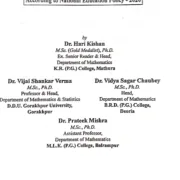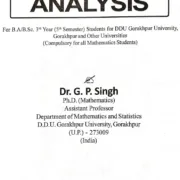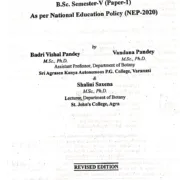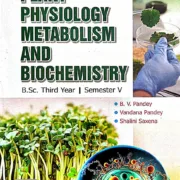No products in the cart.
Categories
My Publication
Shopping cart (0)
Subtotal: ₹0.00
Spend ₹2,000.00 to get free shipping
Congratulations! You've got free shipping.
₹285.00 Original price was: ₹285.00.₹275.00Current price is: ₹275.00.
Publication: Ram Prasad Publication, Agra
Authors:– B.D. Singh [D.C.S. Khandelwal P.G. College, Mau]
– M.K. Singh [M.M.M. P.G. College, Bhatpar Rani, Deoria]
– K.C. Gupta [Govt. Vijiya Raje Girls College ]
Pages: 316
ISBN: 978-93-85630-98-9
Language: English
Class: B.Sc. 2nd Year 3rd Semester
Curriculum: CBCS Curriculum, NEP Policy-2020
69 Students are viewing this books right now
🚚 Shipping Rates & Delivery Dates: See at Checkout!
शिपिंग दरें और डिलीवरी की तारीखें: चेकआउट पर देखें!
🎉 Special Offers on Books: Explore at Checkout!
📚 किताबों पर विशेष ऑफर: चेकआउट पर देखें!
💳 Pay Prepaid & Get Extra 5% Off!
प्रीपेड भुगतान करें और अतिरिक्त 5% छूट पाएं!
🛒 Shop All Books Now!
🛒 सभी किताबें अभी खरीदें!
🚚 Shipping Rates & Delivery Dates: See at Checkout!
शिपिंग दरें और डिलीवरी की तारीखें: चेकआउट पर देखें!
🎉 Special Offers on Books: Explore at Checkout!
📚 किताबों पर विशेष ऑफर: चेकआउट पर देखें!
💳 Pay Prepaid & Get Extra 5% Off!
प्रीपेड भुगतान करें और अतिरिक्त 5% छूट पाएं!
🛒 Shop All Books Now!
🛒 सभी किताबें अभी खरीदें!
Your Payment is 100% Secure
| Weight | 0.400 kg |
|---|---|
| Dimensions | 15 × 1.5 × 25 cm |
| Types Of Book | Paperback |
| Publication Of Book | Ram Prasad Pub. Agra |
| Writer | B.D. Singh[ D.C.S. Khandelwal P.G. College, Mau]. |
| Subject Of Book | Zoology With Practical |
| Class | B.Sc. 2nd Year 3rd Semester. |
| No. Of Pages | 316 Page |
| Language Of Book | English |
Publication: Ram Prasad Publication, Agra
Authors:– B.D. Singh [D.C.S. Khandelwal P.G. College, Mau]
– M.K. Singh [M.M.M. P.G. College, Bhatpar Rani, Deoria]
– K.C. Gupta [Govt. Vijiya Raje Girls College ]
Pages: 316
ISBN: 978-93-85630-98-9
Language: English
Class: B.Sc. 2nd Year 3rd Semester
Curriculum: CBCS Curriculum, NEP Policy-2020
Contents Overview:
Zoology – Semester III
Molecular Biology, Bio-instrumentation and Bio-techniques
1. Introduction (Pages 1-17)
– Overview of molecular biology and bio-techniques
– Importance in the field of Zoology
2. **Process of Transcription** (Pages 18-60)
– Mechanisms of transcription in prokaryotes and eukaryotes
– RNA synthesis and processing
3. **Process of Translation** (Pages 61-100)
– Protein synthesis mechanisms
– Role of ribosomes, tRNA, and mRNA
4. **Regulation of Gene Expression I** (Pages 101-144)
– Control of gene expression in prokaryotes
– Operon models and regulatory proteins
5. **Regulation of Gene Expression II** (Pages 145-167)
– Gene expression in eukaryotes
– Epigenetic modifications and transcription factors
6. **Microscopes: Principle, Types and Applications** (Pages 168-196)
– Basic principles of microscopy
– Different types of microscopes and their applications
7. **Centrifugation and Chromatography** (Pages 197-211)
– Principles of centrifugation
– Types and applications of chromatography
8. **Spectrophotometry and Biochemical Techniques** (Pages 212-268)
– Principles and applications of spectrophotometry
– Various biochemical techniques used in molecular biology
9. **Molecular Techniques** (Pages 269-272)
– Advanced molecular biology techniques
– Applications in research and diagnostics
### Practical Zoology
**Bio-instrumentation and Molecular Biology Lab**
1. **Working Principle of Microscope (Simple, Compound, and Binocular Microscope)** (Pages 1-5)
– Basic operation and maintenance of microscopes
– Practical applications in biological research
2. **Working Principle of Various Lab Equipments** (Pages 6-26)
– Detailed understanding of lab equipment
– Use and calibration of pH meters, electronic balances, glass and micropipettes, laminar air flow (LAF), incubators, water baths, and centrifuges
3. **Buffer and Solution Preparation** (Pages 27-37)
– Preparation of various solutions and buffers
– Measurement of absorbance using colorimeters or spectrophotometers
– Demonstration of differential centrifugation for fractionation of components
4. **Calorimeter or Spectrometer Use** (Pages 38-48)
– Preparation of dilutions and verification using spectrophotometers
– Separation of amino acids via paper chromatography
– DNA extraction demonstrations from blood or tissue samples
### Additional Resources
**Some Useful References for Further Readings** (Pages 49-60)
– A curated list of reference books and articles for deeper understanding and further study.
**Summary:**
“Zoology Molecular Biology Bio-Instrumentation And Bio-Techniques” is a comprehensive textbook tailored for B.Sc. 2nd-year students, focusing on the core areas of molecular biology, bio-instrumentation, and essential laboratory techniques. Authored by eminent professors B.D. Singh, M.K. Singh, and K.C. Gupta, this book provides a balanced blend of theoretical concepts and practical applications, following the latest CBCS Curriculum and NEP Policy-2020 guidelines. Each chapter is meticulously crafted to enhance students’ understanding and foster a strong foundation in modern zoology and molecular biology practices. This textbook is an invaluable resource for students aiming to excel in their academic and research pursuits in the field of zoology.
Be the first to review “Zoology Molecular Biology Bio-Instrumentation And Bio-Techniques Ramprasad” Cancel reply
Related products
Sale
Group And Ring Theory Part-A Ramprasad
🔥 6 items sold in last 7 days
Sale
Tensor Analysis Math.B.sc. 5th Sem. Kanha
🔥 6 items sold in last 7 days
Sale
Diversity Of Chordates And Comparative Anatomy “Zoology” B.Sc. 5th Sem. Ramprasad
🔥 5 items sold in last 7 days
Sale
Plant Physiology Metabolism And Biochemistry Botany B.Sc. 5th Sem Ramprasad
🔥 4 items sold in last 7 days
Sale
Sahitya Shastra Aur Hindi Alochana B.A. 5th Sem Pragati
🔥 4 items sold in last 7 days
You may add any content here from XStore Control Panel->Sales booster->Request a quote->Ask a question notification
At sem a enim eu vulputate nullam convallis Iaculis vitae odio faucibus adipiscing urna.
























Reviews
There are no reviews yet.